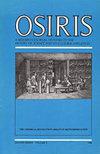算法的摇篮
IF 1
3区 哲学
Q2 HISTORY & PHILOSOPHY OF SCIENCE
引用次数: 0
摘要
本章调查了二战后算法的起源、叙述和纪念活动,这些活动与算法日益增长的文化权威密切相关,最终以中世纪学者阿布·阿达拉·穆罕默德·伊本·穆萨·al-Khwarizmi诞辰1200周年的庆祝活动而告终。我首先展示了苏联数学历史学家是如何宣称花剌子米的遗产的,他们旨在构建一种受辩证唯物主义启发的历史,这一目标最终导致了关于东方数学独特的算法特征的争论。接下来,我研究了这些想法是如何被国际计算机科学家团体在寻找他们学科的起源时所采纳的。苏联后期的纪念仪式与编程扫盲运动的结合演变成了后苏联空间共享的持久文化参考。这种算法的替代象征生命表明,在将算法文化的全球模式历史化时,需要暂停对普遍性的假设。本文章由计算机程序翻译,如有差异,请以英文原文为准。
Algorithm’s Cradle
This chapter investigates the origin narratives and commemoration practices that came hand in hand with the growing cultural authority of the algorithm after World War II, culminating in celebrations in honor of the 1,200th anniversary of the medieval scholar Abu ʿAdallah Muhammad Ibn Musa al-Khwarizmi. I first show how al-Khwarizmi’s legacy was claimed by Soviet historians of mathematics aiming to construct a history inspired by dialectical materialism, a goal that eventually led to arguments about the distinct, algorithmic character of mathematics in the East. Next, I study how these ideas were appropriated by the international community of computer scientists in search of the origins for their discipline. The late-Soviet coupling of commemoration rituals with programming literacy campaigns evolved into an enduring cultural reference shared across post-Soviet spaces. Such alternative symbolic lives of the algorithm suggest a need to suspend assumptions of universality in historicizing the global modalities of algorithmic culture.
求助全文
通过发布文献求助,成功后即可免费获取论文全文。
去求助
来源期刊

Osiris
管理科学-科学史与科学哲学
CiteScore
1.10
自引率
0.00%
发文量
18
审稿时长
>12 weeks
期刊介绍:
Founded in 1936 by George Sarton, and relaunched by the History of Science Society in 1985, Osiris is an annual thematic journal that highlights research on significant themes in the history of science. Recent volumes have included Scientific Masculinities, History of Science and the Emotions, and Data Histories.
 求助内容:
求助内容: 应助结果提醒方式:
应助结果提醒方式:


